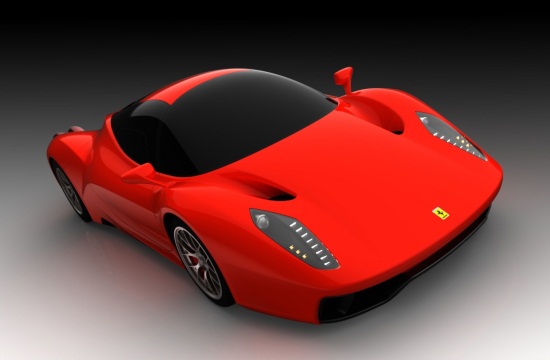Hypercar Hybrids from Porsche and Ferrari
Posted on Dec 17, 2021 in Racing | 4 comments

Design study for the F70
We have written about the incredible Porsche 918 hybrid before, with details here and here. Now, 918 Spyder prototypes have been spotted testing, looking a little like the old 917 race cars (see pix here).
The 918 will produce some 770 hp from a V8 and “two independent electric motors, one on the front and one in the drive line, acting on the rear wheels.” All this with decent fuel economy. Production is expected by the end of 2013, so you have time to save up the $850K it will cost.
The new Ferrari F70 is expected to replace the Enzo and may come to market around the same time as the 918, according to Automotive News. The F70 will probably cost more than the Porsche, but has some amazing technology, which we will illustrate below.
Why are these companies building such monster cars?
1. Because they can sell them (anywhere but in Italy, where taxes on such toys and the economy in general are killing sales). But in China and Asia and the Near East (and even the U.S.), Ferrari is doing swimmingly—first-quarter profits were up 13 percent this year.
2. Celebs and the very rich want the exclusivity and performance of the best, at any cost. There are a lot of these “.01-percenters” around.
3. The technology required by tightening emissions standards forces new solutions to get increased power output—with less carbon input and output.
4. These are super-halo cars and provide bragging rights that are worth a lot.
The F70’s powerplant derives from Ferrari’s HY-KERS system, which has been raced successfully, and uses a midengine layout. It uses two electric motors in an unusual configuration and a 6.4-liter V12 that produces 920 hp and should get from 0-62 mph in less than 2.5 seconds.
What interests me more is how Ferrari has achieved this.
It all appears very complex, and so it is. But these cars aren’t built for the street, actually. They are technological test-beds—and just maybe some of that complex tech can be made to work in future cars that some of us may someday buy.
I still think cutting-edge hybrid technology will pay off sooner and (eventually) for more people than pure battery-powered EVs. Unless, of course, we get some kind of breakthrough in battery technology fairly soon. For which I am not holding my breath.
Shelby’s Cobra performed that kind of payoff for a whole new class of cars, and I wonder whether hybrid technology—once it gets simplified and producible at a price—can do the same for more environmentally friendly cars.





.gif)


Well, what’s funny is that my new Pruis C uses the electric motor to augment the tiny gas engine to produces reasonable performance. The result is that we’re now into the second thousand miles and mileage is up to 56+ MPG. On the other hand, companies like Porsche and Ferrari are creating cars that are true perversions of an economy car like the Prius, not really for better mileage but for even more(and now rediculous) horsepower. These folks are not doing a damned thing to fund battery research that will benefit everyone, but to spend millions to induce people with far too much money to spend more millions on status symbols. Sometimes I think people really need to question why we are letting people consume as much personally as a small town. In some ways, it’s an insult to the whole human race.
What’s also funny is that you have claimed in many a comment that you would buy a Ferrari if you could. Methinks you speak out of both sides of your mouth, señor. Your remarks also imply we would all be better off buying battery-powered economy cars, which is a fantasy. You ignore the fact that these hypercars, overpowered as they may be, are getting much better fuel economy than their predecessors—the Ferrari hybrid gets 40 percent better. Finally, you bring up consumption, arguing, I guess, for limits to be set on piggy rich people. Good luck with that.
I think, as I suggested above, that there may [emphasis on may] be a technological trickle-down here, at least someday. But you don’t address that question.
I’d love to buy a Ferrari, but it would probably be an old 308, probably my favorite. Ditto for Jag, but I’d lean towards the guy selling his V12 XK-E for $35K rather than a newer one, or even a MK II if the price was reasonable. The reason I don’t is that I’ve been around long enough to understand how lust works and how temporary the satisfaction is when you give in to it.
As for trickle down, a hybrid Ferrari is a better example of trickle up. Companies like Ferrari are certainly also-rans when it comes to hybrid and EV technology. Where hypercar makers lead techology is in techniques for high-strength superlight construction and some interesting mechanical components like multi-clutch transmissions.
As for helping the hyperwealthy understand some of the consequences of continuing their obscene levels of consumption, I’d point out what happened to the French aristocracy. Don’t think it can’t happen again.
…and I will acknowledge that most of these hypercars are not built in large enough quantity or driven enough to have the slightest impact on the environment. That’s more a function of the millions of Camry’s, Chevy pickup trucks, and Land Rovers on the road. In trying to think about what hypercars have actually contributed to the world that will make it a livable place in the 22nd century, I can only come up with lightweight manufacturing techniques. But then, who knows? Perhaps Mad Max will tow a Lambo behind his camel?